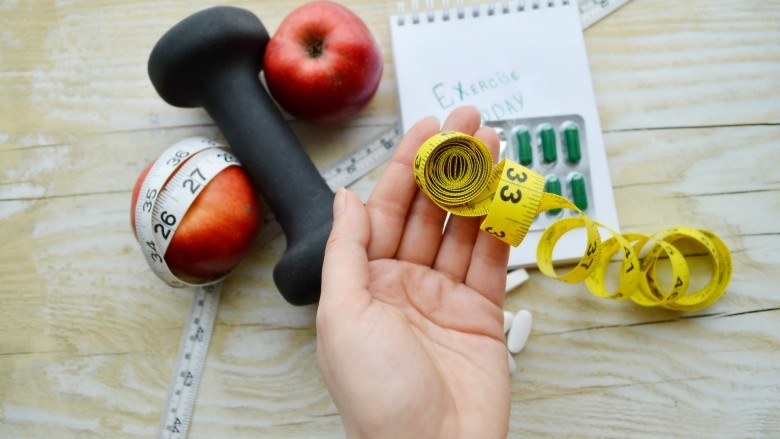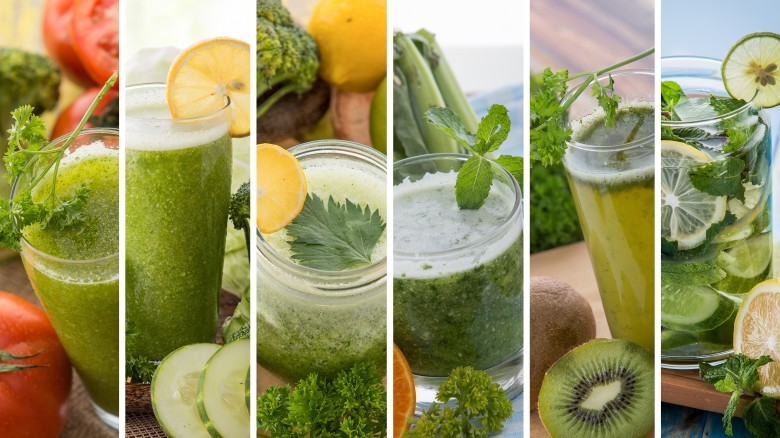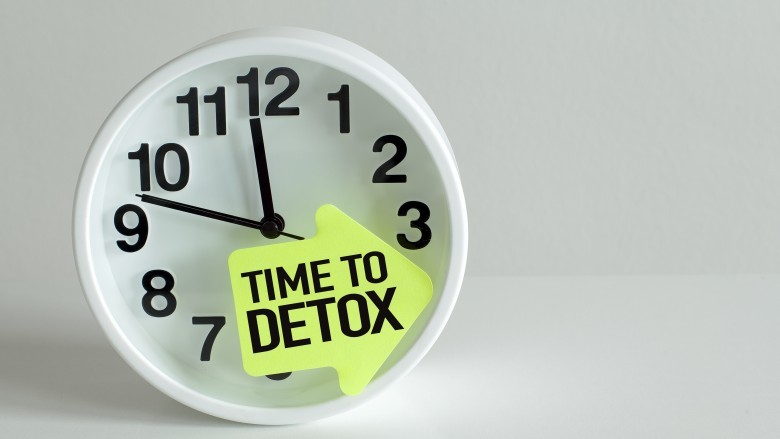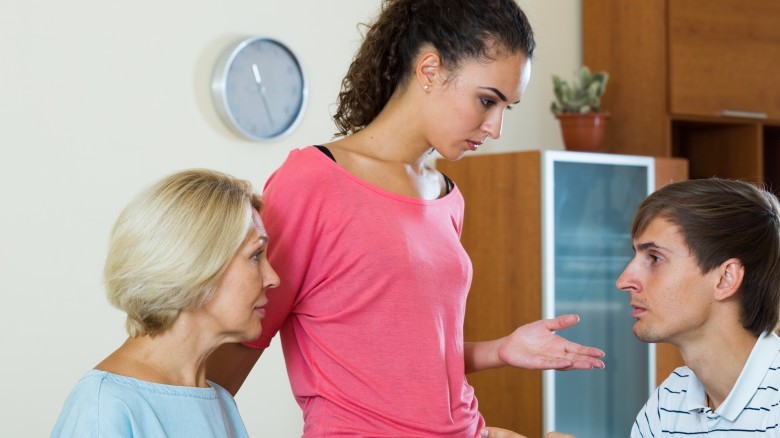Bad Advice You Often See In Women's Magazines
While you're standing in line to check out at virtually any store, you're probably being bombarded with one of two things: chocolate temptation, or women's magazines. The magazines are always brightly colored, and feature impossibly thin women. There are the headlines, too, shouting at you from the cover and promising to make your life, diet, relationships, or wardrobe all better, more effective, stronger or just more awesome. The covers of women's magazines hand out a lot of promises, and it's tempting. Everyone wants a shortcut, or that one tip that's going to really make a difference.
Most of these promises are ones they just can't deliver on, and sometimes, some of the advice you'll find between those brightly colored pages is going to have the exact opposite effect. From bad to downright dangerous, let's take a look at some of the worst advice you can find in women's magazines.
Crash dieting is the way to go
Life is busy, and we've all been there: that moment you realize a holiday, vacation, or wedding is right around the corner. So much for losing that last 10 pounds before you head out to this event that's going to be immortalized in pictures (and on social media) forever. Listen to any one of a number of women's magazines, and they'll share tips they claim are tried-and-true ways to lose a few pounds in a matter of days.
Crash diets touted by women's magazines usually take on a few different forms, but according to cardiologist Isadore Rosenfeld, MD, they are generally characterized by restricting your calorie intake to less than 1,200 a day. That means there are some serious problems with the idea.
Rosenfeld says not only can a crash diet interfere with your body's metabolism to the point where it's going to set you up for weight gain, but adds that it can also increase your chances of dehydration — and it'll put pressure on your immune system as it struggles to keep up and keep you healthy. In case you're wondering why a cardiologist is weighing in on diet, that's because crash diets can have some serious effects on your heart. Restricting your calorie intake on a long-term basis puts a huge amount of stress on your blood vessels, which can lead to tiny tears in your cardiovascular system. That sets you up for all kinds of issues, which is terrifying, considering the National Heart, Lung and Blood Institute says that not only is heart disease the biggest killer of women in the US, but that one in four women die from heart disease. Crash dieting is not the way to go.
Everything about juice cleanses
Along with crash dieting, there are a ton of women's magazines that tout the idea of the juice cleanse as the next great way to get in shape. Part of the practice involves depriving your body of solid food to kick-start a cleanse mode, something that sounds effective... but is it?
Washington, D.C. dietitian Joy Dubost confirms there's just no such thing as a cleanse mode, mostly because our body is always getting rid of toxins of all kinds. There are other problems with a juice cleanse, too, besides the idea that they're just unnecessary.
If you've ever talked to someone who's done a juice cleanse, you might have heard then talk about being hit with some light-headedness, fatigue, or even dizzy spells. They might talk about not having any energy left when they get home, and just collapsing on the couch instead of meeting you at the gym. That's often touted as one of the signs that the cleanse is working and that your body's busy getting rid of all those mysterious, unnamed toxins, but that's not the case at all. Dubost says that's simply your body not having enough nutrients to keep running at peak conditioning, and that's not a good thing.
Other claims you might find in women's magazines are the idea that a juice cleanse is a reset button for your cravings, that it'll help you drop some weight quickly, or that it's going to reset your metabolism. None of that is true — although, you might see some weight loss, which Dubost says is going to be water and muscle. The bottom line is, that juice cleanse isn't going to help you, and it just might end up hurting you.
Everything about detox products
Women's magazines are guilty of pushing all kinds of detox claims, from fighting colds with those detox baths to using foot pads to draw the toxins out of your body. Unfortunately, they're all bogus, and they draw on a pretty ancient belief that toxins build up in the body and make us sick. That goes back to ancient Egypt, and even though we've debunked the idea that toxins are behind what's making us feel ill, magazines still push detoxing as a quick cure-all.
"Let's be clear," Edzard Ernst, emeritus professor of complementary medicine at Exeter University told The Guardian, "There are two types of detox: one is respectable and the other isn't." The former is the process the body needs to purge itself of poisons or drugs, it's done under the supervision of medical professionals, and it's used to treat individuals with substance abuse problems. "The other," he continues, "is the word being hijacked by entrepreneurs, quacks, and charlatans to sell a bogus treatment that allegedly detoxifies your body of toxins you're supposed to have accumulated."
Harsh words, and he backs them up. If you're healthy, the body's already doing exactly what these products claim to make it do. Your liver, kidneys, and even your skin — they're all detoxing your body 24/7, and there's no need to go on any kind of special diet or take a special bath to make it do that. He's not the only one that thinks it's complete baloney, either, and in 2009 a UK charity called Sense about Science gathered up 15 products from pharmacies across the country, and did their investigation. No products actually named the toxins they were getting rid of. They were all gimmicks, like those detoxing foot pads. The charity confirmed that the brown color isn't from toxins, it's from the chemically treated pad interacting with sweat.
Detoxing? Ernst says, "It's a scandal, the criminal exploitation of the gullible man on the street, and it sort of keys into something that we would all love to have — a simple remedy that frees us of our sins, so to speak."
Dress to impress your date
First dates (or second dates, or job interviews, for that matter) are stressful. You know you're going to want to make a good first impression, and there are a ton of magazines out there that have all kinds of advice on what you should or shouldn't wear. That's especially true for first dates, and there are lots of articles on how to dress to grab a guy's eye.
But Bustle writer Meg Zulch argued that's all pretty bad advice, after following it herself on countless first dates. She said she fell into the trap of believing that all that advice on what to wear on a first date was true, and that she needed to dress to appeal to some sort of idealized male opinion. Her "date look" was taking over from her own style and personality, dates were falling flat. She realized that in order to make a first date really successful, she needed to dress for herself, not her date. You want that date to go well because your potential match is interested in you for who you really are, right? So why would you go dressed as someone else?
She found that wearing favorite clothes or favorite lipstick made her more comfortable, more confident, and allowed her to better judge whether or not she was actually compatible with her date on a more personal, everyday sort of scale.
And, some fashion experts agree. When The Every Girl asked experts that included a dating and matchmaking professional, style bloggers and fashion correspondents, they agreed that even though they had their suggestions for what looks best or what's in style, the key was to be comfortable and choose an outfit — and accessories — that were all you, not plucked off a magazine cover.
Everything about supplements
Supplements are one of the nutritional world's current buzzwords, and there's no shortage of advice about how adding some to your diet can make you feel like a new person. But, not only are most supplements unnecessary, they can be dangerous.
Harvard Medical School took a look at some of the most commonly recommended supplements (and this is a study that can be important not just for women, but for the whole family). They looked at a number of dietary supplements, and noted that not everything you find on the market is necessarily healthy — and it's not all regulated by the FDA. That means supplement companies can make any kinds of claims they want, and they're not held to legal standards.
Their research found some startling things. Ever see a headline that warns you about your calcium intake? That much is true — most people don't get enough calcium — but they also found evidence that taking calcium supplements can increase your risk of heart disease. Since women hear about calcium more than men, it's something worth considering. And what about antioxidants? That's another big buzzword, and clinical trials have suggested that not only do antioxidant supplements not have any benefits, but they're also linked to an increase in hip fractures, respiratory infections, heart failure, and some types of cancer. How about fish oil? We hear about that all the time, and while it's been shown to help prevent potential cardiovascular problems, other supposed benefits (like helping alleviate conditions like IBS, arthritis, and even depression) just aren't there.
And some supplements contain more than you might bargain for. The workout supplement Craze was found to contain something with a chemical structure similar to methamphetamine, which was only found when athletes started testing positive for substance abuse. Yikes. So while some supplements might have their place in your diet, you should definitely check with a medical professional and not take this advice at face value.
Diet and exercise are the only way to lose weight
Sure, diet and exercise are an important part of a healthy lifestyle, but how often have you seen headlines that tell you the only way to get fit is hard work? Sometimes, there really is a medical condition that underlies weight loss and gain, and that's not only not usually talked about, it's under-diagnosed and incredibly common.
It's estimated that around 30 million Americans suffer from some kind of thyroid condition, and only about half of those people ever get diagnosed. It's about 10 times more likely to impact women, and if you're over 35, you could run about a 30 percent chance of developing thyroid problems.
The thyroid is responsible for producing a few hormones, and among the problems it can cause is weight gain. It's the part of your body that regulates things like your internal temperature and your metabolism, so it's easy to see just where things can start to go wrong. Symptoms can include a whole host of things, like dry skin, feeling anxious or depressed, insomnia, muscle pain, sore throat, and, of course, weight gain. These are all things that on their own, you might tend to chalk up to being due to the everyday rigors of life. But they're all signs that something else might be going on, and that it might be time to have a talk with your doctor. In these situations, not only are the magazines wrong, but they're making you feel worse about something you just can't control.
Depend more on networking
Networking is another one of those key buzzwords that's floating around these days, and you've probably seen the headlines about all the good that it can do for you. The jury's still out on that, but the Harvard Business Review suggests that for women, relying on mostly on networking is horrible, horrible advice.
When a PhD candidate and a professor from INSEAD teamed up to take a look at just how useful networking really was, they found the benefits for women were few and far between. They looked at 1,815 Wall Street analysts and their professional networks, and found that while men and women tended to have about the same number of people in their circles, men were more likely to actually get help from those contacts.
They also found that men were more accurate in their forecasts, and when they dug deeper and mapped career trajectories, they found that men were typically better at the job because they got more help from their peers. The only time the pattern broke and networking proved to have a concrete impact on a woman's career was if she had close ties to a female executive. Otherwise, all the networking in the world might not save you from the downfalls of the boys' club that still remains at some workplaces.
How to deal with your in-laws
Every family is different, and every family faces their own sets of challenges. But how many times have you seen a headline that promises to teach you an invaluable tip for dealing with pesky, meddling in-laws? And how many of those tips seem to be along the lines of manipulative, or even downright dirty?
While there's no one-size-fits-all for fixing strife between in-laws (or any other extended family member), Family Education gives some great tips on how to confront problems, head others off before they start, and make family relationships less conflicted. They say that the first thing is working together with your significant other to decide what's important, what's not, and what boundaries can be tolerated and which can't be crossed. Limits are limits, and that means enforcing them. You can't do that when you're standing alone, and they say communication — within the marriage and with the in-laws — is crucial. Communication can even get rid of hurt feelings that are accidentally being hurt, sorting out misinterpretations before they become problems.
There's some other great advice they give, too, advice that usually runs contrary to what can be a mess of advice from glossy pages. Know yourself, know what you want, put aside stereotypes, be mature, and don't be afraid to take a step back, collect your thoughts, and cool off.
Dr. Yvonne K. Fulbright, PhD, MSEd, author and consultant to the US Surgeon General's Call to Action program, echoes those ideas. Rather than taking on your in-laws head on, charging into a situation or stooping to the same manipulative tactics, she says there's more important — and better — ways to deal with conflict. Don't try to fake your way through a relationship, don't have expectations, and ultimately, remember that your in-laws are not a part of your marriage and be all right with never getting — and not needing — their approval. That will get you so much father than stooping to their level, which is another thing she says not to do.
The real danger of women's magazines
Those glossy magazines and their shiny covers have their place, sure. But you should also regard their advice with a certain amount of skepticism, and it's something that Dr. Fulbright says that rings most true when you're flipping through those shiny, advice-filled pages.
She says it's important not just to know yourself, but to practice what she calls a "healthy selfishness." That means taking time for you when you need it, and being aware enough of your own needs to make that call. That can be extended to everything in life, whether it's deciding what to wear on that first date or how to approach your husband about his mother. Know yourself, and you'll find less need for magazine advice — and you'll be able to call out the BS when you see it.









